Photographs: Athar Hussain/Reuters
The Abbottabad raid has raised many disturbing questions and the Indian armed forces must find answers to them, says Colonel Anil Athale (retd)
Readers must wonder as to why this author is adding to the virtual saturation coverage of the American operation codenamed 'Neptune's Spear'? Two reasons: First, the operation shows trends that have wider implications than just the war on terror and impacts the likely future American approach to the whole of the South Asian region. The second and pertinent reason from India's point of view is the impact this could have on our own security and relations with the United States, Pakistan and even China.
But right at the outset, let us disabuse ourselves of the silly notion of India being able to carry out a similar operation to nab Dawood Ibrahim or others wanted for their complicity in the 26/11 Mumbai terror attack. The Indian State does not have the will and therefore has not created the wherewithal to carry out such a strike. Indian civil society is frivolous on matters concerning national security and wedded to phoney non-violence of the weak.
We have not taken basic steps like confiscating Dawood's property and cracking down on his illegal business -- this would make him virtually redundant. It is futile to talk of nabbing him in Karachi. About the 26/11 perpetrators, we are shy to hang the murderer in our custody and have already diluted our stand vis-a-vis talks with Pakistan. If Indian soldiers were to carry out an operation similar to the Americans, they may have to stand trial for having killed an 'unarmed terrorist'.
Our NGOs hounded AS Sandhu, an honest police officer in Punjab who fought the terrorists, and forced him to commit suicide!
Did Pakistan know about the operation?
Image: People shout anti-American slogans while holding an image of US President Barack Obama during a protest condemning the killing of Osama bin LadenPhotographs: Reuters
But the manner in which Americans entered Pakistan with impunity and killed Osama has significance beyond the war on terror. We may well see a major re-ordering of the regional dynamics in South Asia. But before one can come to any definitive conclusion the answer to the following crucial questions must be found:
How long was Osama staying at Abbotabad? Was Osama staying in the Abbottabad cantonment without the knowledge of the Pakistani army? How long was he staying there? Was the fact of his stay there not known to the Inter Services Intelligence and Pakistani army? Another variation of this question is, if Osama was staying there merely with the support of 'rogue' elements of the ISI, but without the knowledge of the government/military or the ISI top brass? In short, was Pakistan complicit in hiding Osama in Abbottabad or was its government just inefficient?
Theory A: It was a joint US-Pak operation or at least an American operation that Pakistanis knew about.
This school of thought, in Pakistan and also in India, maintains that Osama was staying at Abbottabad for a short time and he used to come and go. They attribute the ISI and Pakistan's inability to find him to their inefficiency. Babar Sattar, writing in The Dawn newspaper of Pakistan on May 9, laments that 'Our military and intelligence agencies stand indicted for being complicit with terror groups and our best defence seems to be to plead incompetence'.
Most of the 'intelligence failure' theory peddlers claim that it was the ISI that helped America zero in on Osama. They also point to the fact that in the past, Pakistan has nabbed many important terrorists like Khalid Sheikh, Sheikh Libi etc in joint operations. That, however, begs a question, if that was the case, what stopped the ISI from letting a 'normal' operation take place to nab Osama?CIA agents were watching Osama's hideout
Image: Policemen patrol a street near the compound where Osama bin Laden was killed in AbbottabadPhotographs: Faisal Mahmood/Reuters
The proponents of this theory hint that the reason Pakistan is not taking credit for the killing of Osama is due to the fear of an Islamic backlash against the government and the military. The recent murder of Punjab's Governor Salman Taseer by his own bodyguard and the subsequent public support to the murderer lends credibility to this theory.
The Chinese government (interestingly) has come out in support of this theory and point to the fact that electricity was switched off at that time and the area was surrounded by the Pakistani military. Many Indian analysts who support this theory point out the nearly 60-year long co-operation between the ISI/Pakistan military and the US.
This theory has several holes in it. It seems that Osama was staying in Abbottabad for almost five years. He had been there definitely since August 2010 when the Americans first detected his hideout. As to the reports about the area being surrounded by Pakistani soldiers etc, the Chinese have cleverly glossed over the fact that this happened after the attack.
It has also emerged that the Central Intelligence Agency had people on the ground who were keeping a close watch on the compound. This has so far not been denied by anyone. If that was the case, then switching off electricity during the operation is child's play.
There is also the mystery about the crash of a Pakistani helicopter on May 2, according to a report carried by the prestigious The News daily of Pakistan.President Obama deserves an Oscar!
Image: US President Barack Obama and Vice President Joe Biden, Secretary of State Hillary Clinton, Defence Secretary Robert Gates along with members of the national security team, receive an update on the mission against Osama bin Laden in the Situation Room of the White House on May 1Photographs: Courtesy White House
This helicopter may well have been a last minute effort by the Pakistanis to take away Osama; through ground reports they may well have come to know about the American operation. One can blind radars but good old human observers may well have provided a warning to the Pakistanis. While the latter claim that the helicopter crashed due to a technical fault, it is more likely that the chopper was shot down by the Americans.
Another clinching evidence that this was a purely American operation with Pakistan completely in the dark is the classic photograph that the US authorities have released of President Barack Obama, Secretary of State Hillary Clinton and other decision-makers watching the operation 'live' in the White House situation room.
If this was a joint operation and Pakistan was in the loop, then the kind of anxiety and suspense that one sees in that photograph would be totally unnecessary. If this was a fake drama (as the Pakistani master conspiracy theorists are so fond of calling it) then President Obama deserves an Oscar for acting!
It is also being questioned as to how the CIA, which has a heavy presence in Pakistan, missed out on noticing Osama. The answer to that lies in the fact that he was sheltered in a virtual military town, and the Americans were either naive enough to trust Pakistanis or under the ground rules, the Pakistani army areas were a 'no go' zone for the CIA.
US authorities must have considered other options
Image: A sand sculpture of Al Qaeda leader Osama bin Laden created by sand artist Sudarshan Patnaik on a beach in PuriPhotographs: Reuters
The most likely truth is that Osama was sheltered for years by the ISI/Pakistan army. Once the Americans got the lead on him, they kept the operation to nab him totally under their own control since they did not trust the ISI.
There is a Pakistani apologist's version that it was a 'rogue' element that sheltered Osama. May one remind the reader that when the full story of AQ Khan's nuclear proliferation activities emerged, Pakistan conveniently spread a canard that Khan acted alone -- including commandeering a C-130 Hercules aircraft and sending centrifuges to North Korea -- while the army top brass and the government knew nothing about it. Since America accepted this canard for a tactical reason, the Pakistanis are using the same argument again.
Contingency Planning: The What if factor!
Every military analyst worth his salt knows that in an operation of such complexity and risk, various contingencies are taken into consideration and an appropriate response worked out before hand.
The American experience of special operations in the recent past is not a happy one. On April 24-25 1980, Delta Force, a specially constituted elite force to carry out special operations, launched a raid in Iran to free the American hostages held in its embassy in Teheran. 'Operation Eagle Claw' failed as a number of helicopters did not reach the designated area. In addition, there was an accident resulting in the blowing up of a C-130. Then President Jimmy Carter ordered the operation to be abandoned. Carter could never recover from this and remained a one-term president.
Drones or cruise missiles would be too risky
Image: Pakistan Prime Minister Yusuf Raza Gilani speaks during a Parliament session in IslamabadPhotographs: Reuters
More recently, on October 3, 1993, the same Delta Force and 160 Special Operations Unit (the one involved in the Abbottabad raid) launched a military mission to capture Somalian warlord Mohamed Farrah Aidid's foreign minister and political advisor from Mogadishu. The mission failed, resulting in the death of 19 US soldiers (made into a Hollywood movie Black Hawk Down). Then President Bill Clinton on October 6, 1993, ordered a stop to all military actions, opened peace negotiations and withdrew American forces by March 1994.
When President Obama ordered the operation against Osama, the memories of failure of 'Operation Eagle Claw' must have heavily influenced his approach and American contingency planning. Clinton survived the Mogadishu fiasco as Somalia hardly registered on teh American radar. But that is not the case in Afghanistan/Pakistan; especially with a target as important as Osama.
It seems certain that Americans must have prepared a plan B and plan C in case anything went wrong. This author's guess is that the first contingency plan must have been that should for some reason the helicopters fail to reach Abbottabad, then as an alternative the American fighters would launch an attack from the air, using stealth fighters to destroy the compound and kill Osama. The option of using drones or a cruise missile would have been ruled out as too risky! A near-miss may well have hit the Pakistani Military Academy, barely 800 metres away.
America is nearing its end game in Pakistan
Image: US President Barack Obama greets troops at Fort Campbell in Kentucky. He thanked some members of the elite special forces team involved in the raid that killed Osama bin Laden.Photographs: Kevin Lamarque/Reuters
The most difficult part of any commando raid is exfiltration. There is every chance that the enemy may well have detected the raiding party and a reaction is expected. There was a possibility that alerted by the noise of helicopters, the nearby Pakistani military units (though not from the military academy as cadets under training are not capable of this) or even a scratch team from the training staff at the academy could arrive at the scene of action. Military logic says the Americans must have prepared themselves to deal with this reaction by fighting against such Pakistani unit.
Even more plausibly, the nearby airfields may well have launched a Pakistani fighter aircraft to intercept the retreating helicopters. To guard against this possibility, the American fighter aircrafts must have been hovering over the area of operations.
The inescapable conclusion according to military logic is that the Americans were ready to take on the Pakistani army and the air force. Where does that leave the so-called alliance? It seems that the Americans are nearing the end game not just in Afghanistan but in Pakistan as well.Implications for India
Image: Demonstrators set fire to flags of US, Israel and Britain following a special prayer for Al Qaeda leader Osama bin LadenPhotographs: Cihat Caner/Reuters
The contingency planning for the raid on Abbotabad has grave implications for Indian security. It is not known when or if at all America warned India about the impending operation. This is crucial since in the fog of war, if the American aircraft had engaged the Pakistani air force, the Pakistanis may well have come to the wrong conclusion that it was an attack from India and launched retaliatory raids against us.
Were we prepared for such an eventuality? What if that retaliation was with nuclear weapons? After all, Abbottabad is very close to the Pakistani nuclear complex.
The Abbottabad raid has raised many disturbing questions and the Indian armed forces must find answers to them.
Historically, this is the closest that the Americans have come to getting involved in a combat in the Indian subcontinent. The last such occasion was during the 1971 India-Pakistan when during the Indian army's attack on Shakkargarh town, an American adviser was on the verge of being captured by the attacking Indian army. From that close a relationship to nearly clashing with the Pakistan army is indeed a long journey for the US.
Colonel Anil Athale is a former joint director of war studies division, a qualified commando instructor and former infantry officer.



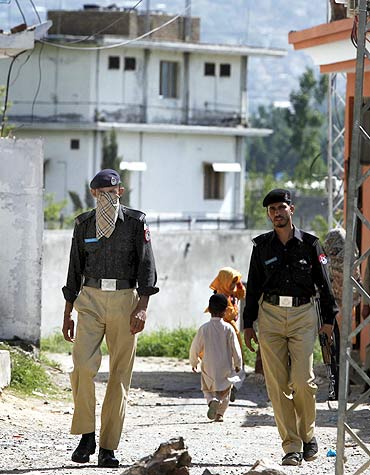

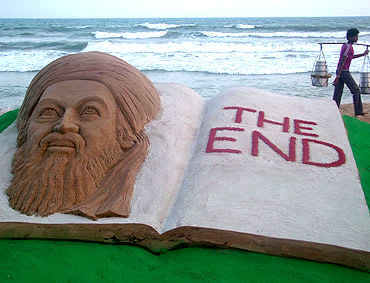
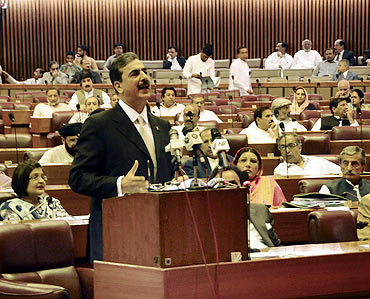
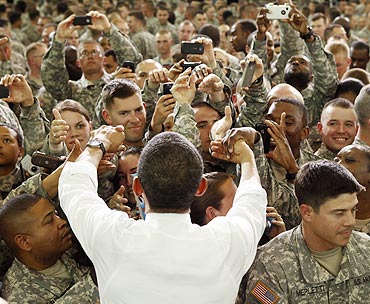
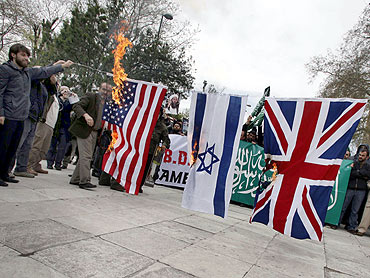
article